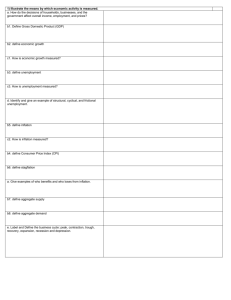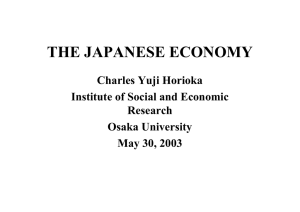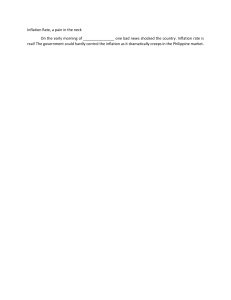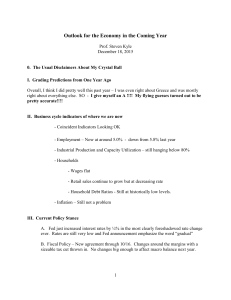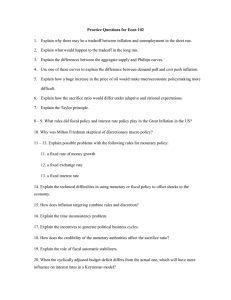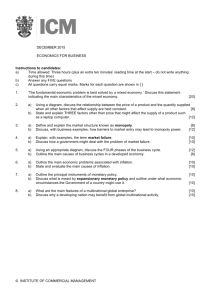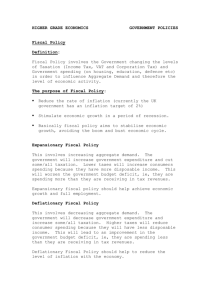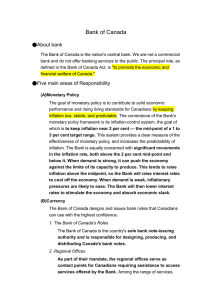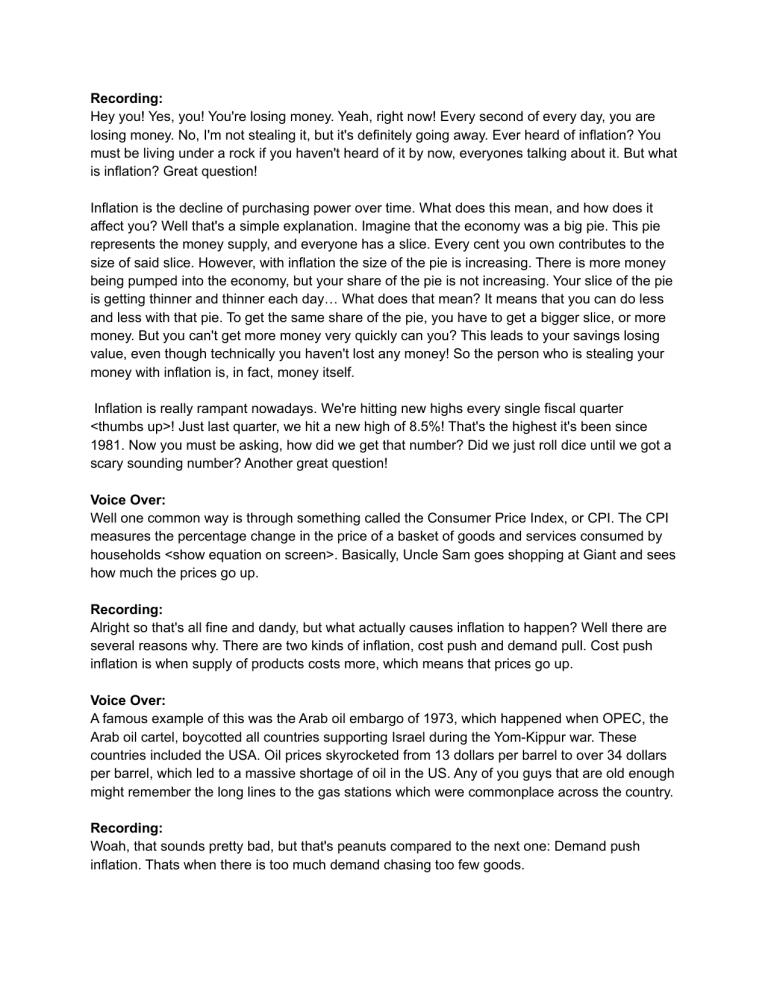
Recording: Hey you! Yes, you! You're losing money. Yeah, right now! Every second of every day, you are losing money. No, I'm not stealing it, but it's definitely going away. Ever heard of inflation? You must be living under a rock if you haven't heard of it by now, everyones talking about it. But what is inflation? Great question! Inflation is the decline of purchasing power over time. What does this mean, and how does it affect you? Well that's a simple explanation. Imagine that the economy was a big pie. This pie represents the money supply, and everyone has a slice. Every cent you own contributes to the size of said slice. However, with inflation the size of the pie is increasing. There is more money being pumped into the economy, but your share of the pie is not increasing. Your slice of the pie is getting thinner and thinner each day… What does that mean? It means that you can do less and less with that pie. To get the same share of the pie, you have to get a bigger slice, or more money. But you can't get more money very quickly can you? This leads to your savings losing value, even though technically you haven't lost any money! So the person who is stealing your money with inflation is, in fact, money itself. Inflation is really rampant nowadays. We're hitting new highs every single fiscal quarter <thumbs up>! Just last quarter, we hit a new high of 8.5%! That's the highest it's been since 1981. Now you must be asking, how did we get that number? Did we just roll dice until we got a scary sounding number? Another great question! Voice Over: Well one common way is through something called the Consumer Price Index, or CPI. The CPI measures the percentage change in the price of a basket of goods and services consumed by households <show equation on screen>. Basically, Uncle Sam goes shopping at Giant and sees how much the prices go up. Recording: Alright so that's all fine and dandy, but what actually causes inflation to happen? Well there are several reasons why. There are two kinds of inflation, cost push and demand pull. Cost push inflation is when supply of products costs more, which means that prices go up. Voice Over: A famous example of this was the Arab oil embargo of 1973, which happened when OPEC, the Arab oil cartel, boycotted all countries supporting Israel during the Yom-Kippur war. These countries included the USA. Oil prices skyrocketed from 13 dollars per barrel to over 34 dollars per barrel, which led to a massive shortage of oil in the US. Any of you guys that are old enough might remember the long lines to the gas stations which were commonplace across the country. Recording: Woah, that sounds pretty bad, but that's peanuts compared to the next one: Demand push inflation. Thats when there is too much demand chasing too few goods. Voice Over: A famous example of this, which I'm sure you all have heard of, is Weimar Germany. In 1918, Germany signed the Treaty of Versailles, which ended the first world war. One of the terms was that Germany owes the Allies 226 billion dollars in today's money. This might not seem like much, considering our over 30 trillion dollar debt, but that was FOUR TIMES their GDP at the time. That's a HUGE debt to GDP ratio, and Germany was in quite the pickle. So what did they do? They went off to the printing press. Well they printed alright, and by 1921 their currency was absolutely worthless. People's life savings melted away, and it caused economic misery in Germany. By the end of it all, Germany had to make an entirely new currency to fix that issue, which you could buy with their old currency at an exchange rate of one trillion to one. Recording: Crazy! But we don't have to throw away the good old US dollar if it gets too hot. We have quite the massive toolbox to fix these kinds of problems. Our tools fall under two broad categories, fiscal policy and monetary policy. Fiscal Policy is when the government does stuff. Ok, that's a little too simple of an explanation, but that's pretty close. Voice Over: Fiscal policy is the governments policy of taxing and spending, or the lack of it. There are two kinds of fiscal policy, expansionary and contractionary. Expansionary is when you grow the economy, by cutting taxes and raising spending. For example, the three stimulus bills passed during COVID are a prime example of expansionary fiscal policy. This kind of fiscal policy is inflationary, which means that it'll cause inflation. The other kind of fiscal policy, contractionary, does the opposite. It contracts, or slows down the economy. This is done to try and get economic growth to a healthy level, or to combat inflation. We barely use contractionary fiscal policy, since no one likes tax increases. Recording: But fiscal policy isnt the only tool we have. In fact, it's not even the most effective one. It takes a long time to pass, and even longer to take effect. When we need quick action, we have monetary policy to help us out. Monetary policy differentiates from fiscal policy because it has nothing to do with congress. “What? Nothing to do with congress? But Congress does everything!” No, it doesn't. The Federal Reserve, our central bank, is in charge of it. Monetary policy is direct control of money and it's value. There are also two types of Monetary policy, expansionary and contractionary. Voice Over: The FED uses monetary policy by manipulating what we call BIRD, or Bonds, Interest Rates, Reserve Ratios and Discount Rates. It can lower interest rates, buy bonds, lower RR and discount rates to stimulate the economy, while also raising inflation, and it can do the opposite to have the opposite effect. Recording: Well that was a mouthful. Inflation sounds like it applies to everything right? Well you’de be wrong about that. Look no further than the CostCo hotdog! Ever since it's inception in 1985, the price has remained at 1.50$ for a hotdog and drink combo. Heres a helpful graph of inflation compared to the CostCo hotdog for reference! Now that's price stability!
